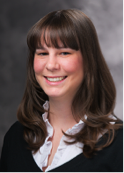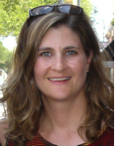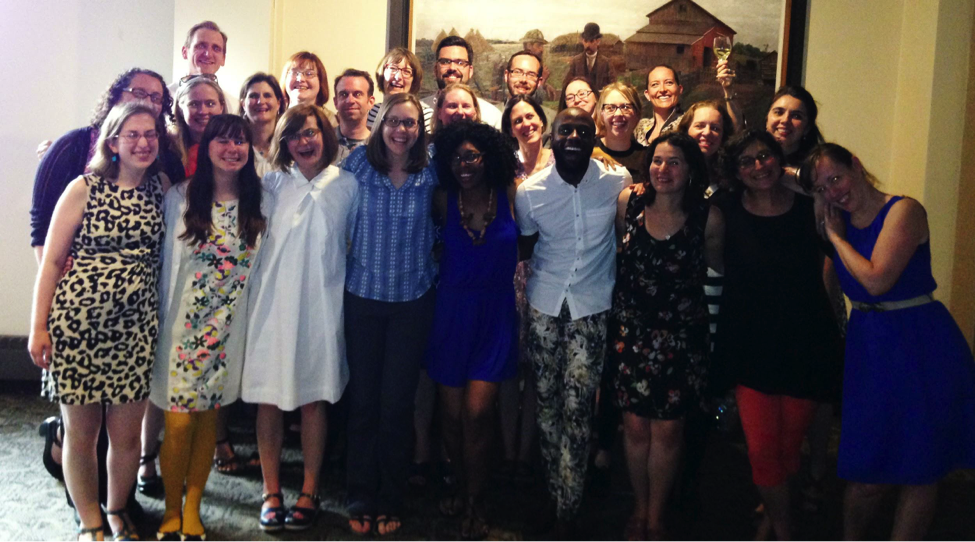Congratulations to Morgen MacIntosh Hodgetts and Jessica Farrell, two of our members that attended the Archives Institute Leadership this summer. See below for some of their reflections!
Archives Leadership Institute applications are due November 30, and here to share some reflections, give some advice, and encourage you to apply are two Chicago-area members of the 2015 cohort.
But first, if you’ve never heard of ALI, let’s catch you up. Funded by the NHPRC, ALI provides advanced training for 25 archival leaders each year, giving them knowledge and tools to transform the profession in practice, theory, and attitude. It’s a heavily-subsidized week-long summer institute (under $1000 for all included lodging, training, meals) that feels much like a retreat. In 2016-2018, the program is located at Berea College in Kentucky.
The 6-member ALI steering committee evaluates applications through December, and the cohort is notified of their acceptance in the early months of the following year. Community building starts virtually, shortly after the cohort is identified. We were assigned small mentor groups consisting of one mentor and four mentees, got to know each other in those small groups, and then shared our introductions with the whole cohort. There were a few pre-reading and assignments leading up to the institute. After the institute, you stay in touch with your small mentor groups with periodic check-ins and there’s usually an ALI event at each SAA conference where you can mix with past and present cohorts. You may have started to catch on to a theme here, which is that ALI is NOT just a week-long one and done experience! And since ALI began in 2008, it’s accumulated many members through the years, creating an exciting critical mass full of potential for steering the archives profession in the future.
ALI cohorts include participants with a range of backgrounds, specializations, job descriptions within the archival field, and of course, personalities! So as you can imagine people apply and attend ALI for a variety of reasons. Here are some personal reflections from two 2015 cohort members:
Jessica Farrell, Curator of Digital Collections for Harvard Law School

I applied to ALI because I was thirsty for more leadership opportunities that I simply wasn’t able to get from my day job. An early career archivist, I have a lot of ambition but haven’t yet snagged a paid leadership position. I supplemented my day job with serving on two professional association steering committees, but I wanted more training to prepare me for a future of leadership in archival practice as well.
ALI taught me a ton of things I already knew and wasn’t recognizing, along with some new skills to take back to the workplace. We are all leaders in so many small and big ways, whether our job title says it or not. Recognizing how we can influence from our current position, whatever that is, is so important, and so possible. I learned that what’s more important than simply “networking” is building and nurturing your community. The ALI cohort is so much more than a network. They are - sorry to get sappy here, but - your friends, mentors, coaches, sounding boards, supporters, and partners in crime for life. Since the end of the institute this June, I’ve already got a long list of things I attribute to ALI: an SAA ‘16 panel proposal, a Twitter account, meaningful connections to way more institutions and people in the field (think ALI cohort + everyone they know + the institutions they’ve worked at in the past, etc. all as possible future connections), some job interviews and even an offer, and most importantly, a completely new level of confidence in my leadership potential...and I’m excited to see how that list will grow.
Morgen MacIntosh Hodgetts, DePaul University, Special Collections Instruction Librarian

I have been interested in a formal leadership training program for a number of years. ALI was on my radar because several good friends and colleagues spoke highly of their experience. And, after this summer’s immersion week and the follow up workshop at the SAA conference in Cleveland it is my turn to share my enthusiasm for this amazing program. I gained tremendous personal insight through ALI’s curriculum, faculty, and mentor groups and I am now shaping my professional goals accordingly. I also have a stronger grasp on how I can contribute to my institution and the special collections and archives community. The ALI experience connected me with a group of highly motivated individuals who share a desire to learn, develop, and inspire others.
Now that we’ve got your full interest in applying for this amazing program, here are some of our tips for the application process:
- Start early! Start NOW! The application is pretty lengthy and consists of a lot of writing. We recommend setting aside about 20 hours to complete it.
- If you’ve applied before and didn’t get in but are still interested, try again. The steering committee encourages repeat applicants. They make tough decisions each year and you’ve certainly grown since the last time you applied, so go for it!
- If you’d like some feedback on your application before turning it in, send it to Rachel Vagts [director@archivesleadershipinstitute.org] and she will facilitate a review.
- With constant access to email and the ability to work from a distance, it can be tough to arrange complete disengagement from your day job for a week. But we recommend it as much as possible! The retreat style of the institute means that it’s held somewhat off-the-grid. It’s designed to make you tune in and interact, staying fully engaged in growing and bettering yourself for a week.
For more information on what ALI is looking for in applicants, visit the call for applications on their website.
And for more tips, feel free to reach out to your fellow CAA members: Jessica, Morgen, Benn Joseph (IIT, Head of University Archives and Special Collections; ALI 2013 Cohort), or Jamie Nelson (DePaul University, Head of Special Collections and Archives; ALI 2014 Cohort). Now, go forth and apply to ALI!

ALI 2015 Cohort, Luther College, Decorah, Iowa, June 2015